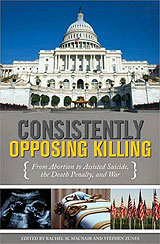
Making the case for pro-life consistency
|
This review first appeared in the July 13, 2008 issue of the North County Times.
They are some of the most intransigent issues we grapple with today: the death penalty, abortion, war. Folks on either side of these issues tend to be confirmed in their beliefs, and public debates about these issues often devolve into shouting matches with all the intellectual depth of a bumper sticker.
A new collection of essays touching on the above issues makes a clear, cogent case that opposing any of these practices ultimately rests on respecting the value of human life – and that, therefore, opponents of one ought to be opponents of all. This is the heart of the "consistent life ethic," still more popularly known under its previous title of the "seamless garment" movement.
At first glance, the arguments in "Consistently Opposing Killing" might seem contradictory. After all, abortion foes are generally presented in the media as religious conservatives, while those against the war in Iraq are painted as liberals.
But editors Rachel MacNair and Stephen Zunes have gathered a strong collection of writings that undermine these sorts of stereotypes, which all too often shape the public's understanding of these issues.
While Nat Hentoff is the best-known of the contributors, and his essay on the interconnectedness of the issues at hand is illuminating, perhaps the more interesting entry is a transcription of a taped conversation between activists who spent the '60s and '70s marching for civil rights and women's equality and against the war in Vietnam and nuclear energy – then found themselves branded as "right-wingers" when they also protested abortion.
Other essays look at how a consistent life ethic should approach animal welfare, whether violence causes emotional damage to those who inflict it as well their victims, and how the use of language shapes our perceptions of those caught up in war, in the death penalty, in abortion and euthanasia.
It's a fairly academic book – not surprising, since MacNair and Zunes are both academics. Thus, many of the essays are rather dry, when a keenly honed passion might bring the issues more the fore for the reader. Clearly, the contributors are passionate about these issues – most have devoted their lives to fighting for their vision of a more just society.
Another weakness is that the majority of the contributors are leftists, or at least very liberal. And yet, one of the threads running through these essays is that a consistent life ethic transcends partisan politics. Surely there are conservatives who oppose war and the death penalty for the same reason they oppose abortion and euthanasia. Including their thoughts would have made for a better book.
Finally, the inclusion of Zunes' diatribe against Israel in this book is utterly confusing. His analogy of Arabs in the West Bank and Gaza to death row inmates or the unborn in abortion clinics is a stretch, to say the least, and his one-sided blaming of Israel for that conflict stands in contradiction to the far more sophisticated and nuanced arguments elsewhere in the book.
Still, for anyone who harbors doubts about their support for the war in Iraq, for legalized abortion, for the death penalty, the book provides affirmation that you're not alone. In its demands for philosophical and moral consistency, it's likely to make almost any reader squirm. Yet it also makes powerful arguments for the interconnectedness of these issues, and offers consistent nonviolence as a reasonable, workable alternative to much of the madness in our world.

